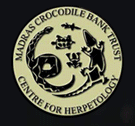 | |
 Entrance to the Madras Crocodile Bank | |
| Abbreviation | CrocBank[1] |
|---|---|
| Formation | 1976 |
| Type | NGO |
| Legal status | Non profit public trust |
| Purpose | Herpetofaunal conservation, research and education |
| Headquarters | Chennai |
| Location |
|
Region served | India |
Official language | Tamil, English |
Founder and director | Romulus Whitaker |
Main organ | Board of Trustees |
| Affiliations | Central Zoo Authority of India IUCN Species Survival Commission |
Staff | 49 |
| Website | www |
12°44′38″N 80°14′24″E / 12.743875°N 80.240107°E
The Madras Crocodile Bank Trust and Centre for Herpetology (MCBT) is a reptile zoo and herpetology research station, located 40 km (25 mi) south of the city of Chennai, Tamil Nadu, India. The centre is both a registered trust and a recognized zoo under the Wild Life (Protection) Act, 1972 and comes under the purview of the Central Zoo Authority, Ministry of Environment, Forest and Climate Change, Government of India. The establishment is located on a 8.5 acres (3.4 ha) site covered by coastal sand forests, along the coast of Bay of Bengal.
The MCBT was established in 1976 with the primary aim of conservation of three Indian species of crocodiles — mugger crocodile, saltwater crocodile and gharial. It was expanded as a centre for herpetology and research of other reptile species in 2003. The centre has bred over 5000 crocodiles since its inception and is one of the largest reptile zoos in the world. As of 2024, the park had 15 species of crocodiles including three critically endangered species and 33 other reptilian species. The park recorded about 4.2 lakh annual visitors from April 2018 to March 2019.
The trust also runs three field stations at South Andaman, Agumbe in Karnataka, and the Chambal valley in Uttar Pradesh as well as a snake venom extraction centre. It is also involved in various research, conservation and educational projects.